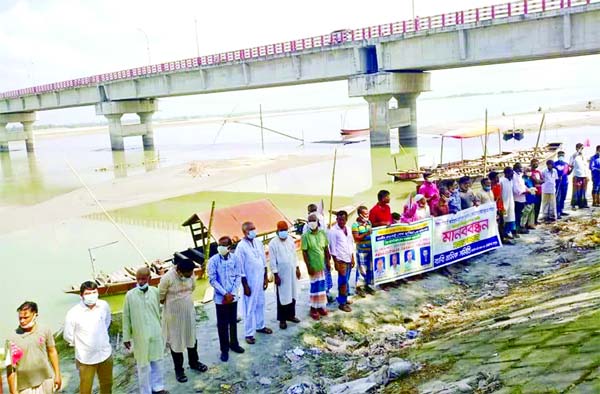Long human chain programs have been carried out on both banks to demand protection of the Teesta River, prevention of floods and erosion, alleviation of human suffering and compensation to the victims. The program was held on Sunday from 11 am to 12 noon at the initiative of ‘Save Teesta, Save River, Sangram Parishad’. The organization claims that the human chain was held in an area of about 230 km on both sides of the Teesta.
According to the organization, the total length of the river Teesta is about 315 kilometers. About 115 kilometers have flowed in Bangladesh. At noon, a long human chain was held simultaneously across an area of 230 km on both sides. The human chain was held from Paschim Chhatnai Zero Point in Dimla Upazila of Nilphamari District, the mouth of the river Teesta, to Haripur Ghat in Haripur Union of Sundarganj Upazila of Gaibandha District (where the Teesta meets the Brahmaputra).
Nazrul Islam Haqqani, president of the organization, presided over the human chain program at Kaunia Point in Rangpur. Tuhin Wadud, a teacher of Begum Rokeya University and a member of the Standing Committee of Teesta Bachao Nadi Bachao Sangram Parishad, Nuruzzaman Khan and others spoke on the occasion. Shafiar Rahman, general secretary of the organization, presided over the function at Uttar Dawabari point in Hatibandha upazila of Lalmonirhat district. Among others, Chhadekul Islam, a member of the Standing Committee of Save Teesta and Save the River Sangram Parishad, among others, spoke on the occasion. Besides, standing committee members Shafiqul Islam Kanu, Amin Uddin, Mozaffar Hossain, Mohammad Ali, Mahmud Alam, Mahabub Alam, Aminur Rahman, Abdun Nur Dulal, Bakhtiyar Hossain and others spoke at different points.
Nazrul Islam Haqqani, president of the organization at Kaunia Point, said that if the Teesta was protected, not only the climate but also the agricultural economy of the region would be protected from catastrophic damage.
Begum Rokeya University teacher Tuhin Wadud said the Teesta River has become destructive due to unilateral withdrawal of water from India and lack of domestic care. If it is possible to take care of the river scientifically, the river will also survive, it will save thousands of crores of rupees. As a result, spending money to protect this river is the most profitable in the country.
Nuruzzaman Khan said, ‘We have no alternative to protect the Teesta river. To get our water from India, there has to be a Teesta treaty on the basis of fair share.
The speakers congratulated Prime Minister Sheikh Hasina for adopting the Teesta Master Plan. At the same time, they demanded speedy implementation of the master plan. A six-point declaration was presented at the rally.
The points are:
1. Effective measures have to be taken to maintain adequate water flow in the river Teesta throughout the year. The river needs to be scientifically excavated to protect it. As a common river, the Teesta agreement should be signed with India on the basis of fair share.
2. The victims of the Teesta erosion and floods will have to be compensated. Housing needs to be provided to the landless and homeless victims of demolition.
3. In the master plan for the protection of the river Teesta, it is necessary to make arrangements for its speedy implementation keeping in view the interests of the people of the river and its banks.
4. The previous relationship of the river with the tributaries, tributaries and tributaries of the river Teesta has to be restored. Adequate reservoirs have to be constructed to retain rain water.
5. Effective measures must be taken to protect the interests of agriculture and farmers in the char areas. The master plan needs to be implemented quickly.

Leave a Reply